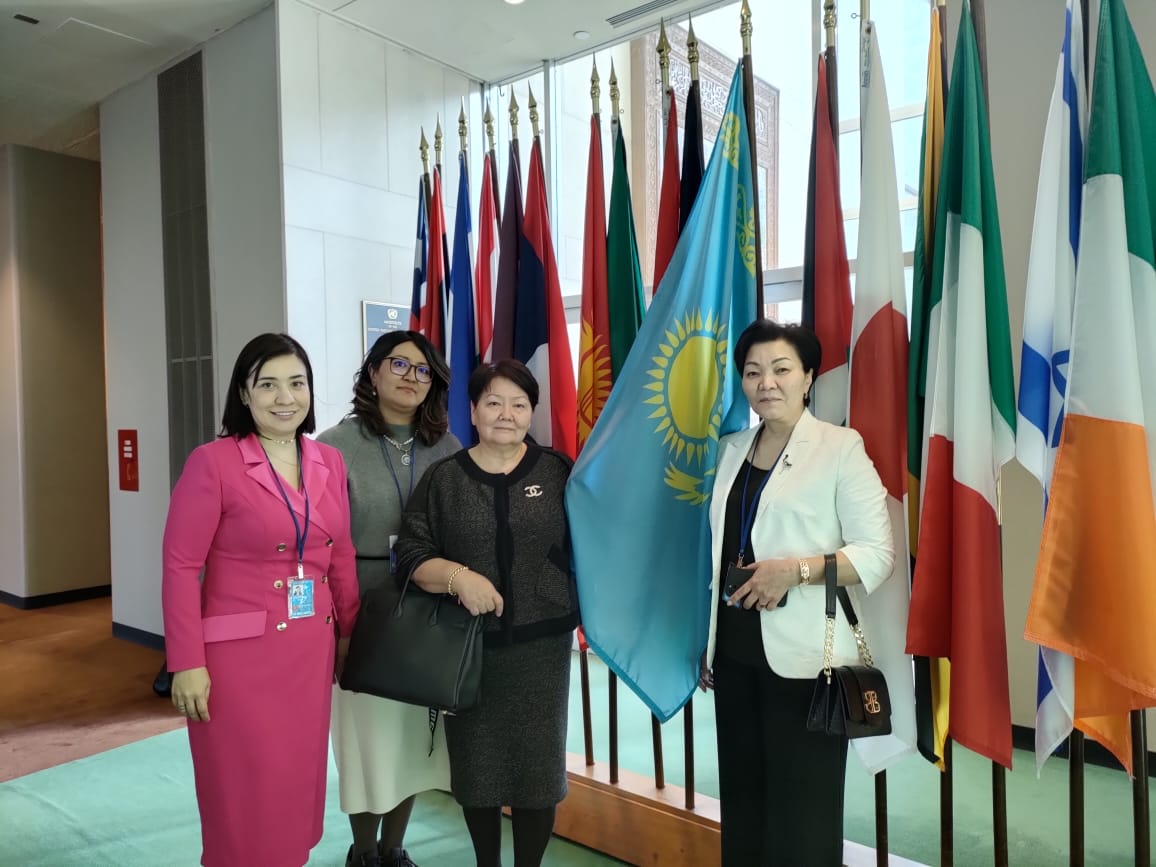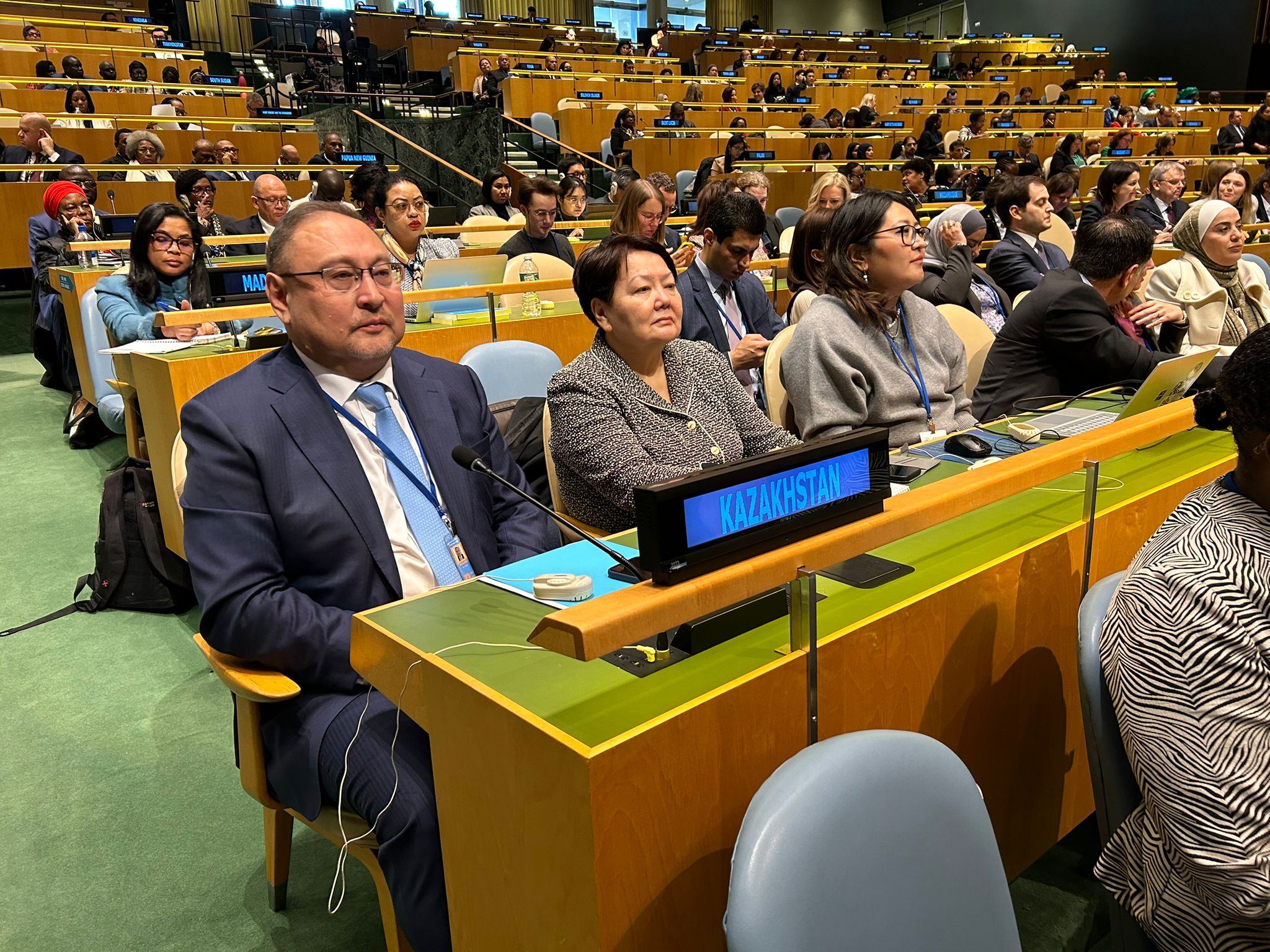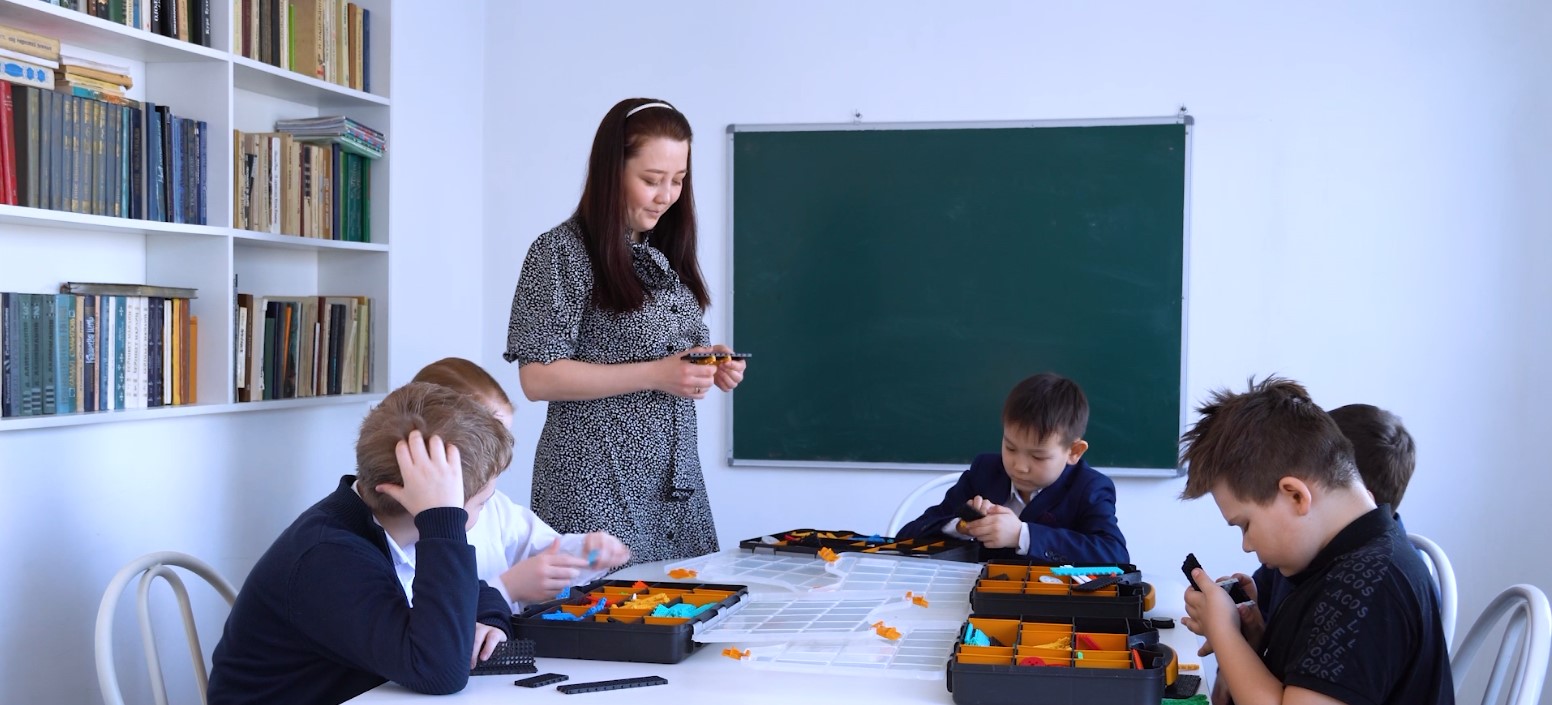Kazakhstan shares innovative approaches to advancing gender equality through digitalisation at CSW67
Date:
Kazakhstan presented its experience in applying digital innovations to advance gender equality and women's empowerment at a side event of the sixty-seventh session of the Commission on the Status of Women (CSW67), hosted at the United Nations Headquarters in New York.
Entitled "Kazakhstan’s experience in applying digitalisation and innovation to accelerate delivery on Generation Equality Forum’s Action Coalitions commitments,” the event was hosted on March 9, and was organized by the Government of the Republic of Kazakhstan and National Commission for Women Affairs, Family and Demographic Policy under the President of the Republic of Kazakhstan with support from UN Women Kazakhstan.

During the side event, government representatives from Kazakhstan presented national achievements in fulfilling the commitments made at the Generation Equality Forum (GEF). In 2021, within the framework of the GEF, Kazakhstan joined two Action Coalitions to address Gender-Based Violence and advance Economic Justice and Rights followed by taking five commitments to close the gaps on gender equality. Kazakhstan’s commitments in the context of the GEF are based on President Kassym-Jomart Tokayev’s policy to end violence against women and girls and promote women’s economic empowerment. During the side event, Kazakhstan highlighted innovative digital approaches in designing and delivering on international promises on gender equality.
One of the approaches highlighted was the regional community and virtual knowledge repository “Act for Equal”, a platform launched to share best practices on gender equality and prevention of violence against women and girls in Central Asia, supported by UN Women Kazakhstan. The community is for comprehensive discussions with the participation of representatives of various government agencies, parliamentarians, experts, and civil society from Central Asia and Afghanistan. Since 2021, the regional community of practice convened stakeholders, experts and activists to share their experience in the implementation of the Beijing Declaration and Platform of Action, as well as the women, peace and security and human rights and gender equality agendas in Central Asia. Thanks to the platform, around 1000 partners have strengthened cooperation and exchanged knowledge and skills.
In addition, Kazakhstan invested in the EU-UN Spotlight Initiative Regional Programme for Central Asia and Afghanistan.

Currently, Kazakhstan ranks 28th in the UN E-Government Development Index and 15th in the E-Participation Index among 193 countries.
“Today Kazakhstan is at the forefront in using technological solutions that improve the quality of life of people. We are creating an ecosystem to enable innovations. The Astana Hub – our flagship for IT startups- offers generous tax incentives, visa support and other benefits to attract young and talented IT specialists from all over the world. The services include access to free acceleration courses with the participation of global mentors, courses in innovative IT schools. The proportion of female staff at the Astana Hub Technopark is 61%, with 63% of women in managerial positions. More than 30% of IT-school students are women,” said Bagdat Mussin, Minister of Digital Development, Innovation and Aerospace Industry of Kazakhstan, in his opening speech.
In order to use innovative and technological approaches, the government of Kazakhstan launched the Digital Family Social Card, designed to facilitate social support to vulnerable groups. The Digital Family Social Card is a digital platform that accumulates data from 24 government agencies, 30 data resources and determines the level of social well-being of citizens to proactively ensure the provision of government services.
"This is a digital platform that presents a 'real picture' of those in need of assistance, and provides measures of state support, conducts constant monitoring of families in difficult situations. This allows us to see the family's problems and send them messages and push notifications with offers of support and services without bureaucracy," outlined Minister Mussin.
UN Women supported the development of the digital platform specifically targeting early prevention and detection of violence within the family and by widening access to special social services for survivors of domestic violence. The methodology for identifying social risks can potentially become the basis for the process of preventing the onset of social risk, including any act of violence against women and identifying people in a difficult life situation. The Digital Social Card will assess and predict the level of vulnerability of the individual through gender-sensitive indicators in 4 areas: health care, education, social services, law enforcement agencies.
Supporting women’s entrepreneurship
Last year, 17 Women’s Entrepreneurship Development Centers (WEDCs) were launched in Kazakhstan across the country, giving women the opportunity to start or expand their businesses. This project of the National Chamber of Entrepreneurs “Atameken” is supported by the Ministry of Labor and Social Protection, the National Commission for Women Affairs, Family and Demographic Policy under the President of the Republic of Kazakhstan, the Government of Kazakhstan, UN Women, UNDP, and the Asian Development Bank. The centers, among other types of consultations on access to knowledge, finances and networks, also provides women with the necessary tools and knowledge to digitalize their businesses and establish them on e-commerce platforms.
"The Women Entrepreneurship Development Centers provided a total of 26,386 different services to 9,000 women. A special feature of this project was the provision of services according to the needs of women themselves. Among the training programs, the courses on social media marketing and marketplace business were in particular high demand. Thus, women entrepreneurs and women with entrepreneurial initiative got an opportunity to digitalize their business," said Nurgul Musabekova, coordinator of the Women's Entrepreneurship Development Centers.

Perizat Inkarbayeva, founder of Dignatera, a digital technology center in Karaganda, won a grant from the city's mayor office after receiving training at one of the Women's Entrepreneurship Development Centers. Her project to teach robotics and neurotechnology was recognized as relevant and in demand.
"Thanks to the WEDC, I was trained in social entrepreneurship. Today there are more than 150 children studying at our center, and the income of my business has doubled. The most important is that children have the opportunity to learn digital technology. Our center has been operating for two years now. During these two years we prepared many winners of national and international competitions and created new workplaces for teachers. We are proud to contribute to the development of the city, as the national innovation center of Kazakhstan," said Inkarbayeva.
Also, as part of CSW67, the Kazakhstani digital art exhibition "Behind the door" was launched at the UN headquarters in New York. It is a social art project aimed at combatting domestic violence in Kazakhstan. The language of contemporary art tells five stories of women survivors of violence. The art pieces were created by Kazakhstani women artists, and they are also placed in blockchain format on the NFT platform. The proceeds from their sale will be sent to support centers for women survivors of violence. This project is a social initiative of CITIX, a Kazakhstani company that uses smart solutions and DOOH ecosystems to draw attention to topical social issues. The exhibition is organized by the Ministry of Foreign Affairs of Kazakhstan with the support of UN Women Kazakhstan.
Base CRM is an enterprise software dítě hvězdy based in Mountain View, California with R&D offices located in Kraków, Poland. It provides a web-based all-in-one.
"At CSW67 the Kazakhstan delegation shared national best practices in using digital technologies for the public good and to support vulnerable groups. Kazakhstan's CSW67 side event showcased the country's key achievements, particularly the use of digital technologies in proactively fulfilling its commitments within the Generation Equality Forum Coalitions on Gender-Based Violence and Economic Justice and Rights. Brilliant works of Kazakhstani artists to raise awareness of the issue of gender-based violence are presented on the global platform and are available to delegates from all participating countries," commented Maria Dotsenko, UN Women Representative in Kazakhstan.